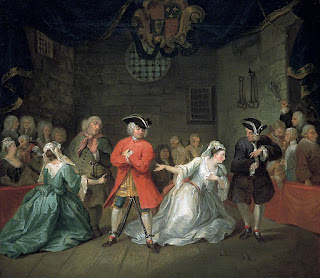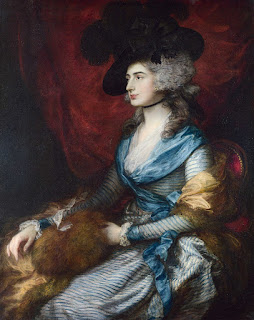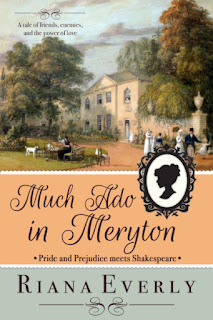Today I’m very happy to be welcoming Riana Everly back to the blog with the blog tour for her new book, Much Ado in Meryton. From the title, you will have guessed there is a Shakespeare influence mixed with a bit of Pride & Prejudice, as the title also mentions Meryton. Although I try and keep my blog mostly focussed on Austen, I actually read Much Ado About Nothing in my early blogging days, so you can learn a bit more about the play here if you're not familiar with it..
Riana has joined us with a guest post about home theatricals, which feature in her book, and also featured in Austen’s life and in Mansfield Park. She’s also treating us to an excerpt from the book. There is also an ebook giveaway to accompany the blog tour. Let’s look at the blurb and then I’ll hand over to Riana for her guest post.
Book Description
A tale of friends, enemies, and the power of love.
"Thou and I are too wise to woo peaceably." –
Benedick, Much Ado
About Nothing, 5.2
Mr.
Darcy's arrival in Meryton raises many people's disdain, and Elizabeth Bennet's
ire. An insult at a dance is returned in full measure, and soon the two find
themselves in a merry war of words, trading barbs at every encounter. Matters
go from bad to worse when Elizabeth and Darcy find themselves living under the
same roof for a time, and their constant bickering frays everybody's nerves.
Will
a clever scheme by their family and friends bring some peace to Netherfield's
halls? And what of Mr. Wickham, whose charming presence is not quite so welcome
by some members of the party? When the games get out of hand and nastier
elements come into play, will everybody's chances for happiness be ruined
forever?
This
clever mash-up of Pride and Prejudice and Shakespeare's Much
Ado About Nothing casts our beloved characters in fresh light, uniting
Jane Austen's keen insight into love and character, and Shakespeare's biting
wit.
Guest Post from Riana Everly - Home Theatricals in Jane Austen’s Time
Thank
you, Ceri, for hosting me here today, and Happy New Year to everybody. Please
accept my wishes for a happy and healthy 2022.
Today
I have theatre on my mind, and only partly because my new novel is itself
partly based on Shakespeare’s play, Much Ado About Nothing.
In
my recent release, Much Ado in Meryton, poor Jane Bennet breaks her
ankle and is housebound at Netherfield for much longer than the three days in Pride
and Prejudice. During this prolonged time, despite her frequent and
not-so-pleasant interactions with Mr. Darcy, Lizzy helps Mr. Bingley keep Jane
entertained. One of the activities they plan is an afternoon of home
theatricals.
So
what, exactly, was this fad all about?
During
the late 18th and early 19th centuries, home theatricals
were quite the rage in the upper echelons of society. There was a wealth of
first-rate theatrical works in the English tradition by that time, dating from
before Shakespeare, and supplemented by such brilliant playwrights as Farquhar,
Goldsmith, and Sheridan, and the tradition of going to the theatre was equally
established. But the Georgian theatre was not always a savoury place to be.
Audiences were boorish and loud, and sometimes even dangerous. It was not
unknown for a riot to break out during a play. And while many from the highest
ranks continued to patronise the theatre, a great many also opted to enjoy
dramatic offerings in the privacy of their own homes.Painting by William Hogarth:
Scene from The Beggar's Opera
We
all know people who love the stage, and this itch to act was present in all
classes. Being able to put on rather elaborate productions at home was a luxury
in which the upper classes indulged with fervour. Furthermore, such private
productions were completely private, since the Licensing Act of 1737 imposed a
fine on anyone acting for “hire, gain, or reward,” in any play not previously
cleared by the Lord Chamberlain. Such exclusivity must only have increased the
allure of mounting a home production of some favourite play.
It
is this type of production we see in Jane Austen’s novel Mansfield Park,
where the Bertrams and their friends not only read a play (and a rather
scandalous one, at that—Lovers’ Vows by Elizabeth Inchbald), but
rehearse to perform it. There are costumes, sets (including the large curtain
that Mrs. Norris later appropriates for herself), and even a select audience of
some friends from the neighbourhood. Through the lens of this production, we
see evolving relationships and character development amongst the crew, ultimately
leading to some very bad decisions for some people, and rather dire
consequences.
Many at the time
would have nodded their heads and urged extreme caution. In the early 19th
century, theatre was still straddling that line between the respectable and the
not. Although some performers were held in great regard, as we see with the
likes of Mrs. Siddons, a favourite of King George III, actresses were still
often considered a step away from harlots. Many actresses did, in fact,
supplement their earnings from the stage with more, er, private performances,
sometimes as mistresses to a single gentleman, sometimes with whomever was
paying the rent or buying supper. In this light, women, especially, were
cautioned about the dangers that play-acting could occasion. Flirtations,
sexual innuendo, and the general lack of restraint that theatre involved were
all perils to a young lady’s character. Painting of Sarah Siddons
by Thomas Gainsborough
But despite the
unhappy light that Austen shines on the play in Mansfield Park, she was
not against the idea of home theatricals at all. Indeed, the Austen family was
known to engage in private theatrical performances at Steventon Rectory first
in the dining parlour and later in the large barn, between 1782 and 1789, when
Jane was a child and young teenager. She, herself, wrote three mini-plays (The
Visit, A Mystery, and the first act of A Comedy, now all
collected in her juvenilia), and may have been involved in the creation of
other works the family put on. Considering the huge effort and attention home
theatricals often involved, young Jane must surely have been involved in most
aspects of organising, rehearsing, and performing popular and classical plays
for a select private audience. Later in life, Jane Austen is known to have
enjoyed a great many theatrical performances in London, and actively followed
many famous actresses much as someone today might follow Hollywood stars.
Among the many
plays the Austen family is known to have put on is Richard Sheridan’s The
Rivals, which they performed in 1784. I have seen this play and laughed my
way through it and decided to use it in Much Ado in Meryton.Playbill of 'The Rivals'
This is the play
that Charles Bingley decides to read one afternoon at Netherfield, during
Jane’s convalescence. The story involves secrets and hidden identities, where
not everybody is who he or she seems.
Here is an
excerpt from the novel. I hope you enjoy it.
~ * ~ * ~
On the second day, Mr. Bingley had yet another plan for their combined amusement. He had been through all the shelves in the library at Netherfield and had discovered some plays which he proposed the company read aloud. “Look, here are some copies of Sheridan’s The Rivals,” he announced, holding a pile of pamphlets containing the lines of the play. “Let us each take a part. Here, I shall be Jack, unless another wishes to take that role. And Miss Bennet, are you inclined to act a part? Perhaps, as the guest of honour at this little party, you would wish to read Lydia.”
“What? Jane be Lydia?” the youngest Bennet daughter
cried out. “That cannot be, for I am Lydia, and only Lydia should read
Lydia!”
“Perhaps you should read Lydia, Lizzy,” Jane
offered. “You have often confessed to me that only the deepest love would tempt
you into marriage, and here is a character who, if I recall the play, desires a
deeply romantic affair de coeur.”
Lydia Bennet flounced off in a huff at being denied
and went to sit by a small cluster of visiting officers. Elizabeth kept her
sigh internal; her sister would one day come to no good if she kept on this
way.
But all thoughts of her sister were cast aside
when, beside her, she saw Mr. Darcy blink at Jane’s words about her desire for
true love. Was he surprised at this? She had thought, after their few days of
entente, that he knew her rather well. She wondered if this piece of news would
increase the ardency of his devotions to her. For now, she must respond to
Jane.
“But what of you, Jane? What shall you read?”
Her sister demurred. “I am no great actress. Let me
take a lesser part. Perhaps Julia, who has some very sweet lines. Perhaps I can
read her.”
“Then you, Bingley,” Richard joked, “ought to read
Faulkland. He makes some very high-flown speeches, which will sit well with
you.”
Mr. Bingley clearly did not know the play, for he
seemed pleased with this suggestion, and at length the parts were divided up
and the pamphlets distributed to all those wishing to participate.
“How unlike Faulkland Mr. Bingley is,” Elizabeth
confessed to Darcy when they had a moment to talk together. “Mr. Bingley is so
open and happy to be pleased, whilst Faulkland is of a very jealous nature,
always believing his lover to be false.”
Darcy laughed. “Indeed, it is so. But whilst
Bingley is not a jealous man by nature, he is easily led. In that way, he is
not so different from his character.”
“Easily led?” Elizabeth asked.
Darcy pursed his lips. “When first I made the
suggestion, so many months ago, that he lease an estate, I meant it in jest,
but he took it right to heart and was immediately convinced that this is what
he must do. He is always happy where he is, but it takes very little for him to
change his mind completely. Why, to see him right now, one would think he never
wishes to leave the countryside, but it would take but a breath for him to
decide that London is the only place he wishes to be.”
“I had not thought him so fickle in his ways.”
Darcy looked very serious. “I would not term him
fickle, for he always intends to be true to his course. But it takes very
little—a comment, or a suggestion, or a joke, even—to turn him to a new path,
to which he also intends to remain quite faithful.”
“Then,” she replied most soberly, “let us hope
nothing arises to turn his feet now.”
Author Bio
Riana
Everly was born in South Africa, but has called Canada home since she was eight
years old. She has a Master’s degree in Medieval Studies and is trained as a
classical musician, specialising in Baroque and early Classical music. She
first encountered Jane Austen when her father handed her a copy of Emma at age
11, and has never looked back.
Riana
now lives in Toronto with her family. When she is not writing, she can often be
found playing string quartets with friends, biking around the beautiful province
of Ontario with her husband, trying to improve her photography, thinking about
what to make for dinner, and, of course, reading!
Riana’s
novels have received several awards and citations as favourite reads of the
year, including two Jane Austen Awards and a Discovering Diamonds review.
You
can follow Riana's blog, and join her on
Facebook and Twitter (@RianaEverly).
She loves meeting readers!
* * *
Buy Links
Much Ado in Meryton is available to buy now in Paperback and various types of ebook including Kindle, Apple books and Nook.
Buy Link:
https://books2read.com/muchadoinmeryton
Add to Goodreads shelf
Giveaway Time!
Riana is kindly giving away five eBooks internationally of Much Ado in Meryton. She has set up a Rafflecopter draw, but for anybody who cannot use the link, please email Riana at RianaEverly@gmail.com with your name and preferred email address and she will add you manually to the list for the draw. Good luck!
To enter the giveaway please use the Rafflecopter
Note about comments: If you have any problems adding your comment please contact me and I will add your comment for you :)
Blog Tour Schedule
Here are Riana’s blog tour stops!
January 7 ~ Babblings of a Bookworm
January 10 ~ Interests
of a Jane Austen Girl
January 11 ~ A Novel Sentiment
January 13 ~ So Little Time… So Much to Read
January 14 ~ Austen Authors
January 17 ~ From Pemberley to Milton
January 22 ~ My Love for Jane Austen
January 27 ~ Austenesque
Reviews






Thank you for having me here today! I'm looking forward to hearing people's thoughts on Austen, theatre, and the excerpt.
ReplyDeleteThank you so much for visiting, Riana, I always enjoy your posts!
DeleteSounds wonderful as I love both P&P and Much Ado About Nothing. Home theatricals sound like a lot of fun so perhaps it's time they make a comeback:)
ReplyDeleteWouldn't that be fun?
DeleteWe actually did this a few years ago. We got together with a group of friends and read through The Importance of Being Earnest. Some of my friends are lousy actors (I'm pretty dreadful too), but I love them anyway, and we had so much fun.
They DO sound like fun!
DeleteSounds like an interesting book. I can certainly see Darcy and Lizzy trading snark.
ReplyDeleteI hope you really enjoy it. It was a balancing act to find just the right amount of snark, and hopefully I found the sweet spot! If you read the book you can let me know.
DeleteYes, they are both quick enough for some repartee, I will look forward to seeing it :)
DeleteLoved the excerpt and how Darcy explains Bingley's personality. I do wonder if he should be saying this to not only Elizabeth but Jane as well. But then Jane would probably only defend Bingley. I am very curious to see how all the characters come together or not. Love the cover and look forward to reading it. Thank you for a chance at the giveaway! Congratulations!
ReplyDeleteIt's certainly a rollercoaster for all of them. Thanks for the comment about the cover - the image is by Georgian-era architect Paul Sandby, and the cover was designed by my wonderful artist Mae Phillips. I have to give her full credit.
DeleteThanks so much for commenting, Carole, and best of luck in the giveaway!
DeleteI have enjoyed other stories by this author. Thanks for a chance to win a copy.
ReplyDeleteThanks so much, and good luck!
DeleteI hope you enjoy this one too, when you read it :)
Deletebeautiful cover
ReplyDeleteThank you. My cover artist is Mae Phillips, and she does beautiful work.
DeleteIt's lovely, isn't it!
DeleteI Look forward to reading it!
ReplyDeleteThanks. I hope you really enjoy it.
DeleteHope you enjoy it when you read it :)
DeleteThank you for the excerpt. Looking forward to the play and story. Interesting explanationto Mr Bingley's character
ReplyDeleteBingley is an interesting character indeed! I hope you enjoy the book!
DeleteGlad you enjoyed the excerpt.
DeleteHmm, so do they actually get to put on this play, or does it fizzle away like in MP?
ReplyDeleteIn this book they just read it through, as an activity to keep Jane entertained while she recovers. But some of the characters in the play bring out aspects of the characters in the novel!
DeleteThat's such a good question, glad you asked :)
DeleteI really love that excerpt. The ending has such wit that it will be hard to forget its goodness. Thank you for sharing this piece and the giveaway.
ReplyDeleteGlad you enjoyed the excerpt!
Delete